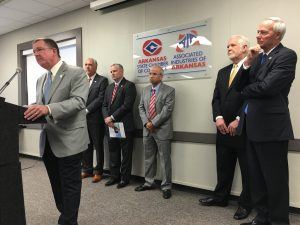Governor, business leaders say medical weed would hurt Arkansas job growth
by September 28, 2016 4:01 pm 478 views

Passage of voter-initiated acts to legalize medical marijuana would make it difficult for employers to maintain safe, drug-free workplaces and would harm Arkansas’ economic development efforts, Gov. Asa Hutchinson, Lt. Gov. Tim Griffin and four business leaders said in a press conference Wednesday.
The two elected officials appeared along with Joe Carter, CEO of Snyder Environmental, an environmental remediation company; Grady Harvell, president and chief operating officer of AFCO Steel; Doug Wasson, president and CEO of Kinco Construction and also representing the Associated General Contractors of Arkansas; and Butch Rice, president and CEO of Stallion Transportation Group and board chairman of the Arkansas Trucking Association.
Voters in November will vote on two proposals. The Arkansas Medical Marijuana Amendment would change the Constitution to allow for-profit dispensaries to provide marijuana to qualifying patients. The Arkansas Medical Cannabis Act would use non-profit dispensaries and, unlike the proposed amendment, allow patients living at least 20 miles from a dispensary to grow their own plants. The amendment will appear as Issue 6 and the act as Issue 7 on the ballot.
The press conference occurred at the Arkansas State Chamber of Commerce, which opposes both initiatives. Hutchinson previously had appeared with medical professionals in a press conference. He said he will focus on regulatory matters later.
Hutchinson referenced a recent Talk Business & Politics-Hendrix College poll showing the Arkansas Medical Marijuana Amendment leading 49-43% while the Arkansas Medical Cannabis Act is trailing, 53-36%. He said he had expected the measures would have more support, and the fact that the poll results are different from each other shows Arkansans are paying attention and making judgments.
“That’s good for us because information is important. It’s knowledge. It will help people make a better decision,” he said.
Hutchinson said the state has a 3.9% unemployment rate, which does not include those who no longer are working for work, and now the key is to return those people to the workforce. Increasing the worker pool will be harder if more workers are failing drug tests, he said.
The business leaders said legalizing medical marijuana would complicate their efforts to enforce drug-free workplaces. Carter said his employees work with hazardous material, but he won’t be able to take action against those using the drug. He said it would be impossible for him to abide by state law and by federal occupational and safety requirements. Legalizing medical marijuana would impact his general liability insurance and worker’s compensation insurance rates and would provide an incentive for him to employ more people in Texas rather than in Arkansas.

Harvell said his employees work with heavy steel and can’t afford to be inattentive. He has plants in Van Buren, Little Rock and Greeley, Colo. While his Colorado plant has seen a 300% increase in terminations because of employees failing random drug tests the last three years, his Arkansas locations have seen a 57% reduction. He said he has been advised he would not be able to continue his company’s drug policies. Wasson also said Kinco Construction would no longer be able to continue its drug program.
Rice said motor carriers are part of a “drug-free, zero tolerance industry,” and legalizing medical marijuana would make the driver shortage even worse. He said he is not worried about the state’s 38,000 professional truck drivers but about passenger car drivers who could cause accidents.
David Couch, sponsor of the Arkansas Medical Marijuana Amendment, said the amendment does not require any employer to allow employees to use medical marijuana on their premises or come to work under the influence. He said employers can now prohibit employees from coming to work under the influence of any medication and the same would be true of marijuana.
Couch said he had been meeting Wednesday with out-of-state representatives who he said wanted to invest in Arkansas. He referenced a recent study by Marijuana Business Daily which asserted that the economic impact of marijuana legalization in the United States will be $44 billion by 2020.
“You would think that the Chamber of Commerce would want Arkansas to be able to participate in some of that $44 billion in economic development,” he said. He later added, “This is a humongous economic development package for this state; plus it’s just compassionate and the right thing to do.”
Ryan Denham, deputy director for the Arkansas Medical Cannabis Act, said, “In the 25 states, in half of the country that have passed medical cannabis, we just don’t see these kinds of problems that the governor and the Chamber of Commerce were predicting that will happen in Arkansas.”
He said driving under the influence will still be a crime under his group’s proposal and that doctors should decide what kind of activity can be done by medical marijuana patients under the law – similar to what’s done with opiates now.
Lt. Gov. Tim Griffin followed the business leaders by saying that today’s good jobs require highly trained, focused, alert employees who can ensure safety – their own, their co-workers’ and the public’s. With employers across the country struggling to find employees who can pass a drug test, the state has a competitive edge over states that have legalized medical marijuana – an edge it would lose if it passes one of the two measures.
The press conference occurred a day after John Robbins, a special master appointed by the Supreme Court, reported that sponsors of the Arkansas Medical Cannabis Act did collect enough signatures to qualify for the ballot. The signatures had been challenged in a court case, Kara Benca vs. Mark Martin. The Supreme Court must make the final ruling.
The Supreme Court earlier had ruled in another case challenging the act that its ballot title is sufficient. Hutchinson said medical marijuana is “going to be, I would expect, on the ballot to be voted on.”
